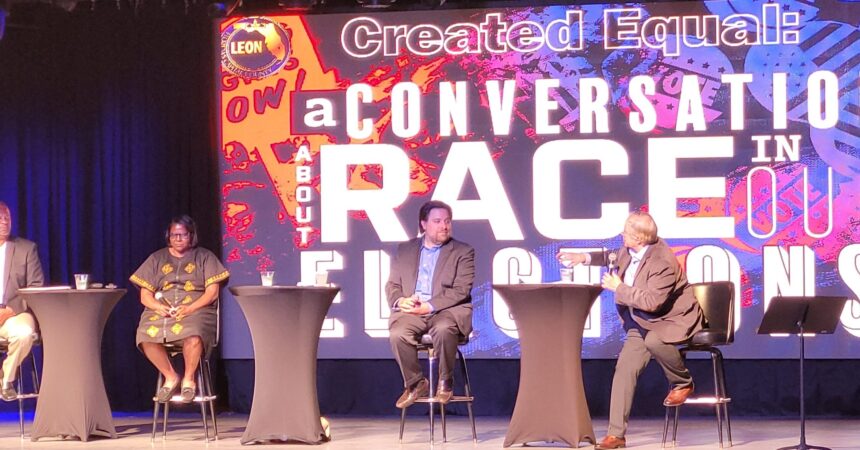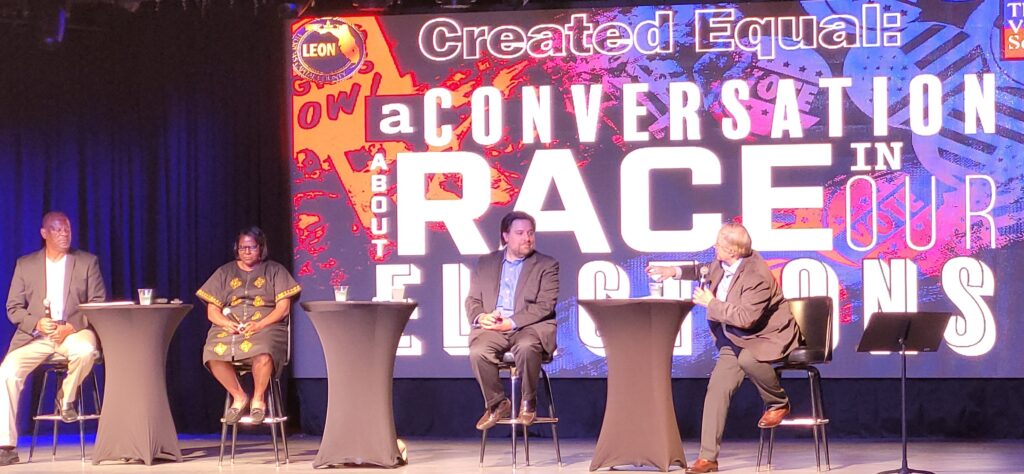
Conversation on race in elections goes beyond the poll and security

Photo by St. Clair Murraine
By St. Clair Murraine
Outlook Staff Writer
The premise was to have a conversation focusing on access to the poll and election security.
But somehow things got to the point that a three-member panel fielded questions about purging of ballots, hearing a history lesson on early efforts to encourage voters’ registration and the possibility of mandating elections.
The event at The Moon was staged by Leon County government and the Village Square, a non-partisan public forum. They billed it as “Created Equal: A Conversation about Race in our Elections.”
It was that indeed, especially with the depth brought by members of the panel who have ties to FAMU, the University of Florida and Florida State. Right out of the chute, Sharon Austin, a Professor of Political Science at the University of Florida, delved into the question of trust when it comes to elections.
Austin prefaced her main points by mentioning how Souls to the Polls, a pre-election tradition with Black churches, was dormant before being revived. She also said that keeping fraud in the headlines amounts to “a campaign strategy.”
“I think elected officials need to do more to try to educate people; teach people about voter fraud,” Austin said.
There seemingly was a consensus on the stage that concerns over the small number of registered voters in minority communities is one that’s in part the result of voter suppression. Voting rights advocates have been speaking out over the uptick of recent election laws, but it was a battle that Vernon Damer took up in the early 1900’s around Hattiesburg and Forrest County, Miss.
Keith Parker, a professor in the Department of Sociology and Criminal Justice at FAMU magnified Damer’s effort with a slide presentation. Damer, who Parker said was the first to use the phrase “if you don’t vote you don’t count” while registering voters, was assonated in 1965.
“To me, the Damer family is the epitome of patriotism,” Parker told the audience of about 400.
He added that despite the new laws the challenge isn’t in the system but in the voters.
“We have to fix ourselves and come to the realization based on overwhelming evidence from the last election that our voting system was extremely secured,” Parker said. “I’m very concerned about what’s going to happen in the future because a lot of the conspiracy theories are seeping into offices where I am convinced that if they get into position to do what they want to do, then our system will be challenged.”
Parker’s points about the struggle by Blacks to gain the right to vote resonated with 18-year-old Ananda Chatterjee. He is a recent Rickard High School graduate who traveled to Selma, Ala., for a project he did on the legacy of the Voting Rights Act of 1965.
Creating new laws to making it difficult for ex-felons to vote, along with a slew of other new voting law are “Obstructing everything that these civil rights activists fought for,” said Chatterjee, who will vote for the first time in the midterm elections. “It’s important that people of my generation honor this legacy and ensure that voting rights are protected for everyone.”
Just last week; in fact, a day after last Thursday’s conversation took place, a federal appeals court ruled that Florida should reinstate its restrictive voting law just three months before midterm elections begin with a primary in August.
Gov. Ron DeSantis signed SB 90, which added new restrictions that includes limiting activities like giving food or water to a voter in line. The issue has been in the courts since spring and judge Mark Walker ruled that part of the law discriminate against Black voters. However, the state appealed the ruling and was granted the request.
Despite the new laws, voters can help themselves by just getting information through their supervisor of elections office, said Michael Morley, a FSU College of Law professor who is a member of the Florida Advisory Committee for the U.S. Commission on Civil Rights.
“I think when people have a better awareness of what the facts on the ground are, that will help to make us curious to conspiracy theories or baseless speculation,” Morley said. “I think transparency is another critical component.”
Not every question to the panel came from moderator Tom Flanagan. A few came during a question and answer segment with the audience. Two sticking concerns were whether Florida purges it voting rolls and if elections can be mandated.
The answer to both was no.
Attendee Mickey Adair said he found the information useful but not much of it was new. He suggested that a voter registration campaign like the one undertaken by Stacey Abrams in Georgia, could take some of the teeth out of Florida’s new voting laws.
Rudy Ferguson, a candidate for a Leon County Commission at-large seat, said the conversation was timely for shedding light on who are affected most by the new voting laws.
“I believe that most people in vulnerable communities or Black communities are discouraged from voting due to voters’ suppression, whether it be the petitions, or your signature doesn’t match on your voter registration card, people in vulnerable communities have lost all interest in elections,” Ferguson said. “Nevertheless, this is a good conversation to encourage them to find that place because you don’t vote; you don’t count.”






